I wanted to incorporate the solution presented by Edgar but still have the features of the DefaultModelBinder. So instead of creating a new model binder I went with a different approach and replaced the JsonValueProviderFactory with a custom one. There's only a minor change in the code from the original MVC3 source code:
public sealed class NumericJsonValueProviderFactory : ValueProviderFactory
{
private static void AddToBackingStore(Dictionary<string, object> backingStore, string prefix, object value)
{
IDictionary<string, object> d = value as IDictionary<string, object>;
if (d != null)
{
foreach (KeyValuePair<string, object> entry in d)
{
AddToBackingStore(backingStore, MakePropertyKey(prefix, entry.Key), entry.Value);
}
return;
}
IList l = value as IList;
if (l != null)
{
for (int i = 0; i < l.Count; i++)
{
AddToBackingStore(backingStore, MakeArrayKey(prefix, i), l[i]);
}
return;
}
// primitive
backingStore[prefix] = value;
}
private static object GetDeserializedObject(ControllerContext controllerContext)
{
if (!controllerContext.HttpContext.Request.ContentType.StartsWith("application/json", StringComparison.OrdinalIgnoreCase))
{
// not JSON request
return null;
}
StreamReader reader = new StreamReader(controllerContext.HttpContext.Request.InputStream);
string bodyText = reader.ReadToEnd();
if (String.IsNullOrEmpty(bodyText))
{
// no JSON data
return null;
}
JavaScriptSerializer serializer = new JavaScriptSerializer();
// below is the code that Edgar proposed and the only change to original source code
bodyText = Regex.Replace(bodyText, @"(?<=:)\s{0,4}(?<num>[\d\.]+)\s{0,4}(?=[,|\]|\}]+)", "\"${num}\"");
object jsonData = serializer.DeserializeObject(bodyText);
return jsonData;
}
public override IValueProvider GetValueProvider(ControllerContext controllerContext)
{
if (controllerContext == null)
{
throw new ArgumentNullException("controllerContext");
}
object jsonData = GetDeserializedObject(controllerContext);
if (jsonData == null)
{
return null;
}
Dictionary<string, object> backingStore = new Dictionary<string, object>(StringComparer.OrdinalIgnoreCase);
AddToBackingStore(backingStore, String.Empty, jsonData);
return new DictionaryValueProvider<object>(backingStore, CultureInfo.CurrentCulture);
}
private static string MakeArrayKey(string prefix, int index)
{
return prefix + "[" + index.ToString(CultureInfo.InvariantCulture) + "]";
}
private static string MakePropertyKey(string prefix, string propertyName)
{
return (String.IsNullOrEmpty(prefix)) ? propertyName : prefix + "." + propertyName;
}
}
Then to register the new value provider you need to add the following lines to your Global.asax:
ValueProviderFactories.Factories.Remove(ValueProviderFactories.Factories.OfType<JsonValueProviderFactory>().FirstOrDefault());
ValueProviderFactories.Factories.Add(new NumericJsonValueProviderFactory());
